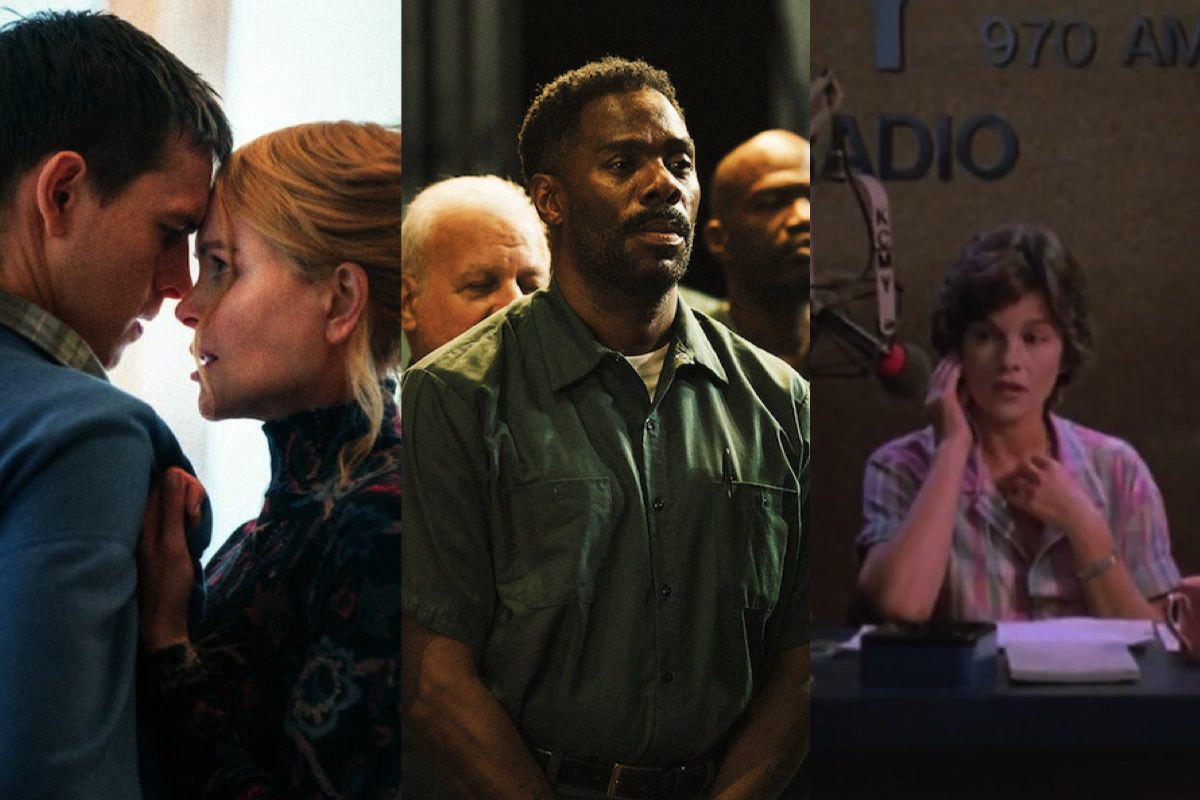Every Tuesday, discriminating viewers are confronted with a flurry of choices: new releases on disc and on demand, vintage and original movies on any number of streaming platforms, catalogue titles making a splash on Blu-ray or 4K. This twice-monthly column sifts through all of those choices to pluck out the movies most worth your time, no matter how you’re watching.
PICK OF THE WEEK:
Sing Sing: Greg Kwedar’s moving prison drama is, first and foremost, a showcase for the considerable talent and gravitas of Colman Domingo, who continues to prove himself one of the most gifted actors of our time. Kwedar and co-writer Clint Bently based their script on the factual Rehabilitation Through the Arts program at Sing Sing Maximum Security Prison, in which prisoners learn social skills and teamwork by staging plays for “the population,” and much of the supporting cast is comprised of real-life alumni of the program. There is a plot, and it’s well-developed—Domingo is a founding member who feels pushed out by an intimidating new addition to the group—but the picture thrives in its quiet moments and lived-in details. (Also streaming on Max.) (Includes audio commentary, deleted scenes, and featurettes.)
ON AMAZON PRIME:
Twisters: While your correspondent was never exactly over the moon for the ’96 Twister, its specific lazy-weekend-cable-standby appeal can’t be denied. At its best, this sorta-sequel from Minari director Lee Isaac Chung recaptures that appeal; it’s a totally serviceable thrill ride, with a handful of spectacular set pieces and convincing “very bad weather” effects, and Chung is too good a director not to let a fair amount of Midwestern atmosphere drift in. The script is about as flimsy this time around, and unfortunately, star Daisy Edgar Jones doesn’t have the kind of charismatic grit it would take to bring life to her paper-thin character. But Glenn Powell calls up all of his movie-star juice as her enemies-to-lover foil, and is good enough for both of them; executive producer Steven Spielberg’s note to cut their climactic kiss may be his worst call since agreeing to direct Ready Player One.
ON 4K/ BLU-RAY / DVD / VOD:
Babygirl: Halina Reijn’s provocative erotic drama knows what it’s like to be inside a BDSM relationship, how it feels when the thing you need, on a basic and feral level, exceeds your control of it. Romy, the C-suite businesswoman played with skill by Nicole Kidman, knows (and the film does too) that she’s potentially undercutting her job and jeopardizing her family, but as she puts it, “There has to be danger, there have to be things at stake.” It’s rare to find a filmmaker who even understands that, much less is savvy enough to convey it within a dramatic narrative without seeming like they’re making a movie about kamikaze pilots. Babygirl falls apart a bit in the home stretch, when the conflicts and conclusions veer into the kind of conventional and predictable territory that, until then, Reijn has studiously avoided. But if she fumbles there, it’s forgivable; what she achieves here far outweighs the mild shortcomings. (Also streaming on Max). (Includes audio commentary, deleted scenes, and featurettes.)
ON 4K:
Godzilla vs. Biollante: Criterion’s love affair with Godzilla is genuinely heart-warming, the purest example of the label granting equal footing to high and low art, and their latest valentine is the luminous 4K treatment they’ve lavished upon this 1989 entry in the so-called “Heisei series.” Opening at the end of the big guy’s 1984 comeback The Return of Godzilla (re-cut and released in the States as Godzilla 1985), the screenplay by writer/director Kazuki Ōmori questions the ethics of genetic engineering (pre-Jurassic Park, bravo). It features some of the best effects in the series, delivering the city-smashing and kaiju-fighting you expect from the series, but also the frills and flourishes of a well-made, giddily entertaining late-‘80s action flick. (Includes audio commentary, featurettes, deleted special effects, TV spots and trailers, and essay by Jim Cirronella.)
Choose Me: Alan Rudolph came up as something of an apprentice to Robert Altman, and much of this 1984 romantic comedy (new to the Criterion Collection) shows his influence: the oddball characters, the multi-channel sound, the clever embedding of music (and for the record, more movies should put a musical number under their opening credits). But it also boasts plenty of Rudolph’s swoony, specific style; it’s a movie about unabashed romantics, people who can’t keep themselves from falling in love, in spite of their deep and personal knowledge of how much it can hurt. David Carradine is the most reckless of the bunch, a cocksure wanderer who keeps asking women to marry him; among the proposees are an electric Leslie Ann Warren, an enchanting Rae Dawn Chong, and an enigmatic Genevive Bujold. It’s an eccentric charmer, like a long, looping song that keeps spinning off in unexpected directions. (Includes interviews and essay by Beatrice Loayza.)
Venom: God, I love this stupid movie. And no, it’s not the Marvel movie with Tom Hardy; this is the 1981 British exploitation movie, new on 4K from Blue Underground, which features (in order of descending terror) Klaus Kinski, a black mamba snake, Oliver Reed, and Sterling Hayden. Its pedigree is impressive — the producer is Martin Bregman (Serpico), and the score is an early Michael Kamen effort. But it’s pure, gleeful exploitation, in which a gang of servants and criminals kidnap a rich kid, only to have their caper thwarted by the boy’s accidental acquisition of a killer snake. So an unlikely mixture of Jaws rip-off and Dog Day Afternoon riff, with its cast of lunatics chewing up scenery by the handful; Kinski’s last scene is an especially full meal. (Includes new and archival audio commentaries, new interviews, trailers and TV spots, and essay by Michael Gingold.)
Tommy Boy: Chris Farley and David Spade could’ve been one of the great movie comedy teams; like Abbott & Costello and Laurel & Hardy, their personalities and comic sensibilities were both polar opposites and pointedly complimentary, fueled by mutual affection and respect. Their dynamic is best showcased in Peter Segal’s 1995 comedy (upgraded to 4K for this 30th anniversary edition), which remains quotable, dopey fun, custom-built for its leading pair, and backing them with a deep bench of supporting MVPs. The screenwriting and filmmaking are serviceable at best, but y’know what? You can say that for plenty of those Abbott & Costello movies too. (Includes audio commentary, deleted and extended scenes, alternate takes, gag reel, featurettes, and TV spots.)
Delicatessen: This 1991 black comedy (new on 4K from Severin) marked the feature directorial debut of French filmmakers Jean-Pierre Jeunet and Marc Caro, known for their wild, distinctive visual style; it was also the breakthrough effort of the great cinematographer Darius Khondji. The plot, concerning the regulars of a post-apocalyptic butcher shop and the inhabitants of the apartment building above it, is convoluted to the point of abstraction; it’s really just a clothesline upon which Caro, Jeunet, and their co-writer Gilles Adrien hang wordless sequences of delightful invention, and others where dialogue is minimal and simple. It casts a spell, twee in spots and disturbingly dark in others, and it’s easy to see how Jeunet and Caro amassed so much attention upon its release. (Includes audio commentary and interviews.)
Antiviral: Brandon Cronenberg’s feature debut (also getting a Severin 4K) is visually striking and unsurprisingly cynical, even if the premise is a touch convoluted. It imagines a near-future society that’s become so celebrity-obsessed that companies like “the Lucas Clinic” can sell, at high prices, the viruses and sicknesses of your favorite public figures. But if you go along with it, from moment to moment, it plays and occasionally (especially at its conclusion) stings — thanks in no small part to protagonist Caleb Landry Jones, an ideal blank slate who can be both a cipher and a freak, sometimes simultaneously. (Includes audio commentary, deleted scenes, short film, featurettes, interviews, and EPK.)
Don’t Torture a Duckling: Lucio Fulci’s 1972 mixture of giallo and poliziotteschi is sleazy right from the jump, focusing (and lingering) as it does on a series of child murders in an Italian village. It takes some unexpected turns, particularly halfway through, when Fulci leans squarely into the supernatural realm he’s been hinting at until then; he also gets in some welcome shots at the Catholic church. The needle drops are deliciously incongruent, the gore is over the top (an early toe-dip into the waters that would define the next phase of his career), and the score is a banger. (Includes audio commentary, featurettes, interviews, trailer, and essays by Barry Forshaw and Howard Hughes.)
ON BLU-RAY:
A Woman of Paris: Charles Chaplin opened this 1923 “drama of fate” with an onscreen disclaimer: “I do not appear in this picture. It is the first serious drama written and directed by myself.” There’s a reason it was also the last; turned out, Chaplin wasn’t nearly as skilled at crafting drama as he was at creating comedies with melancholy undertones. But this is nevertheless a fascinating experiment by the filmmaker, gorgeously mounted — the costumes, sets, and cinematography are all immaculate — and a convincing portrait of high life in the 1920s (Chaplin makes these parties look like a ball to attend, and he would know). Edna Purviance, leading lady for most of his early short comedies, proves a more than capable dramatic star, and Criterion’s restoration glistens. (Includes alternate score, introduction, video essays, archival interviews, deleted shots, archival footage, trailers, and essay by Pamela Hutchinson.)
Losing Ground: Kathleen Collins’s 1982 indie drama (new on Blu from Milestone) is a low-budget effort, with some of the obvious earmarks. But like the contemporaneous Cane River, it feels handmade, genuine, an earnest attempt to capture and share a mostly unrepresented version of Black life in the 1980s. Deeply steeped in academia and the art world, it tells the story of Sara (Seret Scott), a professor and wife of a painter who accompanies him on a summer retreat that opens up long-stifled questions about her identity and desire. Collins is admirably kind to her cinematic forefathers (filmmaker Bill Gunn and Night of the Living Dead star Duane Jones turn up in supporting roles), and it’s filled with moments of quiet revelation and offhand intelligence. (Includes audio commentaries, earlier Collins films, new and archival interviews, Collins masterclass, and trailer.)
The Glass Web: Jack Arnold’s 1953 3-D noir opens with its credits shattering and shooting out of the screen, a real oh yeah, that’s the stuff moment for the 3-D sickos in the audience. But the picture is surprisingly light on the bang-pow effects; it’s a compelling entertainment first, and a gimmick second. So we get a tightly wound, Big Clock/No Way Out-style thriller, with John Forsyth as the producer of a TV crime show who’s the most likely suspect in the murder of his one-time fling (Kathleen Hughes, going for it), when in fact she was offed by his chief researcher (Edward G. Robinson, riffing on his sad sap Scarlet Street persona). Arnold excels at this kind of snub-nosed genre filmmaking, and clearly learned the tech well; the following year, he’d direct Creature from the Black Lagoon. (Includes audio commentary, 2-D and 3-D versions, theatrical trailer, and TV spot.)
Diary of a Chambermaid: Jeanne Moreau stars in this 1964 drama/satire from director Luis Buñuel, as (yes) a chambermaid who works for the most vapid French bourgeoisie imaginable. That’d be enough for most filmmakers, but no one gets away clean in a Buñuel picture, so her fellow servants are pretty vile as well, and even our heroine is no innocent victim; in fact, he gets a good running bit out of the way that everyone she encounters falls for her, in spite of (because of?) her clear and unapologetic indifference. Few could even pull such a role off, and perhaps no one could do it as well as Moreau; watch her expression of utter boredom as the dithering grandfather fusses with her boots. A wickedly pitch-black comedy, full of freaks and bastards, crisply restored by KL Studio Classics. (Includes audio commentary, featurette, interviews, and trailer.)
Monster from the Ocean Floor: Film Masters continues its admirable mission of Roger Corman restoration with this, his first solo producer effort, a 1954 creature feature made with even more modest means than the Corman norm. That means the sound is even tinnier and the effects are even shoddier, yet it’s blessed with the Mickey-and-Judy “let’s put on a show” spirit that makes even Corman’s lesser efforts so charming. Keep an eye out for the man himself in a cameo role. (Includes audio commentary, new and archival interviews, trailers, and liner notes by Tom Weaver.)



